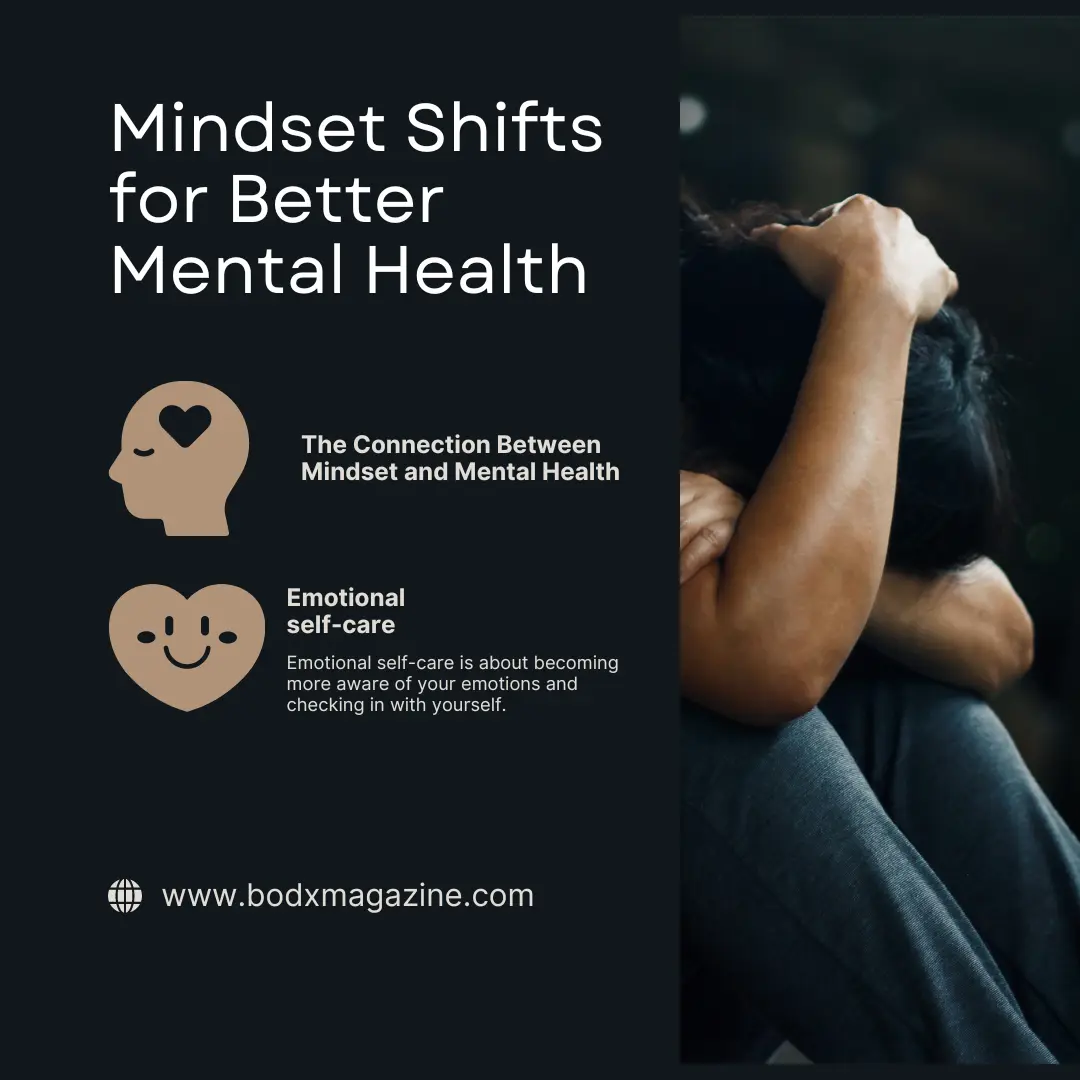In today’s fast-paced world, maintaining mental health is more crucial than ever. Our mindset plays a pivotal role in how we perceive and react to life’s challenges. By making specific mindset shifts, we can significantly improve our mental well-being. This article delves into various mindset shifts that can lead to better mental health, providing practical tips and insights to help you on your journey.
Understanding the Power of Mindset
The Connection Between Mindset and Mental Health
Our mindset is the lens through which we view the world. It influences our thoughts, emotions, and behaviors. A positive mindset can lead to improved mental health, while a negative mindset can contribute to stress, anxiety, and depression. Understanding this connection is the first step toward making meaningful changes.
Fixed vs. Growth Mindset
Psychologist Carol Dweck introduced the concepts of fixed and growth mindsets. A fixed mindset believes that abilities and intelligence are static, while a growth mindset believes that they can be developed through effort and learning. Embracing a growth mindset can lead to resilience, a key component of mental health.
Mindset Shifts for Better Mental Health
1. Embrace Self-Compassion
Understanding Self-Compassion
Self-compassion involves treating yourself with the same kindness and understanding that you would offer to a friend. It means recognizing that everyone makes mistakes and that these mistakes do not define your worth.
Practical Tips for Practicing Self-Compassion
- Acknowledge Your Feelings: Allow yourself to feel without judgment.
- Practice Positive Self-Talk: Replace self-criticism with supportive and encouraging words.
- Mindfulness Meditation: Engage in mindfulness practices to stay present and reduce self-judgment.
2. Cultivate Gratitude
The Benefits of Gratitude
Gratitude has been linked to numerous mental health benefits, including increased happiness, reduced stress, and improved relationships. It shifts your focus from what you lack to what you have, fostering a positive outlook.
Ways to Practice Gratitude
- Gratitude Journaling: Write down three things you are grateful for each day.
- Express Appreciation: Tell others how much you appreciate them.
- Mindful Moments: Take a moment each day to reflect on the good things in your life.
3. Develop Resilience
What is Resilience?
Resilience is the ability to bounce back from adversity. It involves adapting to challenges and maintaining a positive outlook despite difficulties.
Building Resilience
- Set Realistic Goals: Break down large tasks into manageable steps.
- Stay Connected: Build a support network of friends and family.
- Learn from Experience: Reflect on past challenges and how you overcame them.
4. Adopt a Growth Mindset
Benefits of a Growth Mindset
A growth mindset encourages continuous learning and improvement. It helps you view challenges as opportunities for growth rather than obstacles.
How to Foster a Growth Mindset
- Embrace Challenges: See them as opportunities to learn and grow.
- Learn from Criticism: Use feedback as a tool for improvement.
- Celebrate Effort: Focus on the process rather than the outcome.
5. Practice Mindfulness
Understanding Mindfulness
Mindfulness involves being fully present in the moment without judgment. It helps reduce stress and increase self-awareness.
Incorporating Mindfulness into Daily Life
- Mindful Breathing: Take deep breaths and focus on your breath.
- Mindful Eating: Pay attention to the taste, texture, and smell of your food.
- Mindful Walking: Notice the sensations in your body as you walk.
Overcoming Common Mental Health Challenges
Dealing with Stress
Identifying Stressors
Recognize the sources of your stress. It could be work, relationships, or financial issues. Identifying stressors is the first step in managing them.
Stress Management Techniques
- Exercise Regularly: Physical activity can reduce stress hormones.
- Time Management: Prioritize tasks and set realistic deadlines.
- Relaxation Techniques: Practice yoga, meditation, or deep breathing exercises.
Managing Anxiety
Understanding Anxiety
Anxiety is a natural response to stress, but chronic anxiety can affect your mental health. It is essential to recognize the signs and take steps to manage it.
Anxiety Reduction Strategies
- Cognitive Behavioral Therapy (CBT): Work with a therapist to change negative thought patterns.
- Mindfulness Meditation: Practice mindfulness to stay grounded.
- Healthy Lifestyle: Maintain a balanced diet, exercise, and get enough sleep.
Combating Depression
Recognizing Depression
Depression is more than just feeling sad. It involves persistent feelings of hopelessness and a lack of interest in activities you once enjoyed.
Steps to Overcome Depression
- Seek Professional Help: Consult a therapist or counselor.
- Stay Active: Engage in physical activities to boost your mood.
- Connect with Others: Build a support network of friends and family.
Creating a Supportive Environment
Building Strong Relationships
The Importance of Social Connections
Strong relationships provide emotional support and a sense of belonging. They can help you navigate life’s challenges and improve your mental health.
Tips for Building Strong Relationships
- Communicate Openly: Share your thoughts and feelings with others.
- Show Empathy: Listen and understand others’ perspectives.
- Spend Quality Time: Engage in activities that you enjoy together.
Setting Boundaries
Why Boundaries Matter
Setting boundaries is essential for maintaining mental health. It helps you protect your time and energy and prevents burnout.
How to Set Healthy Boundaries
- Be Assertive: Communicate your needs clearly and respectfully.
- Learn to Say No: Prioritize your well-being by declining requests that overwhelm you.
- Respect Others’ Boundaries: Recognize and honor the boundaries set by others.
Creating a Positive Environment
The Impact of Your Environment
Your physical environment can influence your mental health. A cluttered or chaotic space can contribute to stress and anxiety.
Tips for a Positive Environment
- Declutter Regularly: Keep your space organized and tidy.
- Incorporate Nature: Add plants or spend time outdoors.
- Create a Relaxation Space: Designate an area for relaxation and mindfulness practices.
Conclusion
Improving mental health requires intentional mindset shifts. By embracing self-compassion, cultivating gratitude, developing resilience, adopting a growth mindset, and practicing mindfulness, you can enhance your mental well-being. Overcoming common mental health challenges, creating a supportive environment, and building strong relationships are also crucial steps. Remember, mental health is a journey, and making these mindset shifts can lead to a more fulfilling and balanced life.
FAQs
1. What is the difference between a fixed mindset and a growth mindset?
A fixed mindset believes that abilities and intelligence are static, while a growth mindset believes that they can be developed through effort and learning.
2. How can I practice self-compassion?
You can practice self-compassion by acknowledging your feelings, practicing positive self-talk, and engaging in mindfulness meditation.
3. What are the benefits of gratitude?
Gratitude can increase happiness, reduce stress, and improve relationships by shifting your focus from what you lack to what you have.
4. How can I build resilience?
You can build resilience by setting realistic goals, staying connected with a support network, and learning from past experiences.
5. What are some mindfulness practices I can incorporate into my daily life?
Mindful breathing, mindful eating, and mindful walking are simple practices you can incorporate into your daily routine.
6. How can I manage stress effectively?
You can manage stress by exercising regularly, practicing time management, and engaging in relaxation techniques like yoga or meditation.
7. What are some strategies to reduce anxiety?
Cognitive Behavioral Therapy (CBT), mindfulness meditation, and maintaining a healthy lifestyle can help reduce anxiety.
8. How can I overcome depression?
Seeking professional help, staying active, and connecting with others are essential steps to overcome depression.
9. Why are strong relationships important for mental health?
Strong relationships provide emotional support and a sense of belonging, helping you navigate life’s challenges and improve your mental health.
10. How can I create a positive environment for better mental health?
You can create a positive environment by decluttering regularly, incorporating nature, and designating a relaxation space.



















